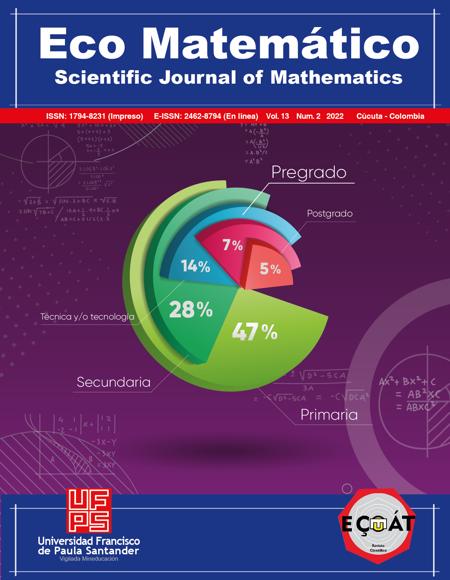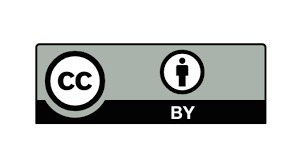Project-based learning and its relationship with motivation and learning of mathematics
Aprendizaje basado en proyectos y su relación con la motivación y aprendizaje de las matemáticas
Main Article Content
In the reality that the world lives in times of pandemic, education has faced strong changes in the way content is approached, hence the need to address issues that for some are as complex as those associated with mathematics in a way where the student had an active participation, this is how this proposal focused on incidence of project-based learning for the development of mathematical competencies in secondary education. It is developed under a quantitative approach, with correlational scope and pre-experimental design, the project called "The Da Vinci Code" was based on, in this project, processes, methods and mathematical attitudes associated with quality standards for the tenth grade are articulated strengthening the development of skills while allowing the incorporation of digital resources and technological means to solve problems and do mathematical modeling. According to the results, it can be affirmed that project-based learning as a work methodology allows the development of research competencies, increasing motivation and improving some higher-order skills that allow them to get closer and closer to the domain of scientific methods.
Downloads
Publication Facts
Reviewer profiles N/A
Author statements
Indexed in
- Academic society
- Universidad Francisco de Paula Santander
- Publisher
- Universidad Francisco de Paula Santander
Article Details
Alcober, J., Ruiz, S., y Valero, M. (2003). Basado En Proyectos En La Epsc (2001-2003). Escuela Politécnica de Superior de Castelldefels (EPSC) Universidad Politécnica de Cataluña (UPC)
https://upcommons.upc.edu/handle/2117/350331
Amador, Y. (2018). El modelo pedagógico tradicional. Arquetipo de la educación en el siglo XXI. Su influencia en la enseñanza del derecho. Algunas reflexiones sobre el tema. III Congreso Internacional Virtual Sobre La Educación En El Siglo XXI, marzo, 791–802.
https://www.eumed.net/actas/18/educacion/67-el-modelo-pedagogico-tradicional-arquetipo.pdf
Barrows, H.S. (1986). A Taxonomy of problem-based learning methods. En Medical Education, 20, 481-486.
https://doi.org/10.1111/j.1365-2923.1986.tb01386.x
Benjumeda, F. J., Romero, I. y López-Martín, M. M. (2015). Alfabetización matemática a través del aprendizaje basado en proyectos en secundaria. En C. Fernández, M. Molina y N. Planas (eds.), Investigación en Educación Matemática XIX (pp. 163-172). Alicante: SEIEM
https://rua.ua.es/dspace/bitstream/10045/51385/1/2015-Actas-XIX-SEIEM_14.pdf
Bryson, E. (1994). Will a project approach to learning provide children opportunities to do purposeful reading and writing, as well as provide opportunities for authentic learning in other curriculum areas? Unpublished manuscript. ERIC Document Reproduction Service No. ED392513
https://files.eric.ed.gov/fulltext/ED392513.pdf
Blank, W. (1997). Promising practices for connecting high school to the real world (p. 15-21). Authentic instruction. In W.E. Blank y S. Harwell (Eds.), Tampa, FL: University of South Florida.
https://eric.ed.gov/?id=ED407586
Cenich, G. y Santos G. (2005). Propuesta de aprendizaje basado en proyectos y trabajo colaborativo: experiencia de un curso en línea. Revista Electrónica de Investigación Educativa, 7(2).
https://www.redalyc.org/pdf/155/15507204.pdf
De Miguel, R (2020). Qué es, qué beneficios aporta y cómo se pone en marcha el ABP en el aula. Educación 3.0. Líder en Innovación Educativa
https://www.educaciontrespuntocero.com/noticias/abp-en-el-aula-beneficios/
Fajardo Pascagaza, E., y Gil Bohorquez, B. (2018). El aprendizaje basado en proyectos y su relación con el desarrollo de competencias asociadas al trabajo colaborativo. Amauta, 17(33), 103–118.
https://doi.org/10.15648/am.33.2019.8
Gómez-Pablos, V. (2018). El valor del aprendizaje basado en proyectos con tecnologías: análisis de prácticas de referencia (Tesis doctoral). Universidad de Salamanca.
https://gredos.usal.es/handle/10366/139484
Orozco Alvarado, J. C., y Díaz Pérez, A. A. (2018). Aprendizaje Basado en Proyectos. Experiencia didáctica en Educación Secundaria implementando las TIC en la asignatura Aprender, Emprender y Prosperar. Revista Científica de FAREM-Estelí, 25, 38–52. https://doi.org/10.5377/farem.v0i25.5674
Harwell, S. (1997). Promising practices for connecting high school to the real world (p. 23-28). Project based learning. In: W.E Blank Y S. Harwell (Eds.), Blank y S. Harwell (Eds.), Promising practices for connecting high school to the real world (p. 15-21).
https://eric.ed.gov/?id=ED407586
Kilpatrick, W.H. (1918) The Project Method. The Use of the Purposeful Act in the Educative Process. New York: The Teacher College. Columbia University.
http://www.educationengland.org.uk/documents/kilpatrick1918/index.html
Lira, R. (2016). Diseño y seguimiento del proceso de Investigación: Realidad, método y concepto. Managua: PAVSA
http://catalogo.ihnca.edu.ni/cgi-bin/koha/opac-detail.pl?biblionumber=64818
López, A. (2016). La motivación y el trabajo por proyectos para el aprendizaje de las matemáticas en Educación Primaria. Universidad de Cantabria.
https://repositorio.unican.es/xmlui/bitstream/handle/10902/8730/LopezMartinezAna.pdf?s
Martí, J., Heydrich, M; Rojas, M., Hernández, A (2010) Aprendizaje Basado en Proyectos, una experiencia de innovación docente. Revista Universidad Eafit p. 11-21
https://publicaciones.eafit.edu.co/index.php/revista-universidad-eafit/article/view/743/655
Muñoz, A; Rey, C., y Domínguez, M. (2021). Iniciación al Aprendizaje Basado en Proyectos: Claves para su implementación. Universidad de la Rioja.
https://dialnet.unirioja.es/servlet/libro?codigo=785222
Muñoz, J y Matos, M. (2006). Diseño y validación de un cuestionario para medir las actitudes hacia las matemáticas en alumnos de eso. Revista Galego-portuguesa de Psicoloxía e Educación
https://core.ac.uk/download/pdf/61900647.pdf
OCDE (2017), Marco de Evaluación y de Análisis de PISA para el Desarrollo: Lectura, matemáticas y ciencias, Versión preliminar, OECD Publishing, Paris
https://www.oecd.org/pisa/aboutpisa/ebook%20-%20PISA-D%20Framework_PRELIMINARY%20version_SPANISH.pdf
Orozco, J. (2016). La Investigación Acción como herramienta para Formación Docente. Experiencia en la Carrera Ciencias Sociales de la Facultad de Ciencias de la Educación de la UNAN-Managua, Nicaragua. Revista Científica de FAREM-Estelí. Medio ambiente, tecnología y desarrollo humano, (19):5.17
https://www.camjol.info/index.php/FAREM/article/view/2967
Pérez, A. (2018). Ventajas de aprender a través de proyectos. Consultoría Educativa de México. Coedumexico
https://www.youtube.com/watch?v=c7EAimGN-P0&ab_channel=Ana%C3%ADsP%C3%A9rezGuti%C3%A9rrez
Planas, N. (2011). Innovación y buenas prácticas en la enseñanza de las matemáticas en secundaria y bachillerato. En V. Font, J. D. Godino, J. M. Goñi y N. Planas (Eds.), Matemáticas. Investigación, innovación y buenas prácticas (pp. 57-160). Barcelona: Graó.
https://sede.educacion.gob.es/publiventa/PdfServlet?pdf=VP14522.pdf&area=E
Sanmartí, N. y Márquez, C. (2017). Aprendizaje de las ciencias basado en proyectos: del contexto a la acción. Ápice. Revista de Educación Científica, 1(1), 3–16.
https://ruc.udc.es/dspace/bitstream/handle/2183/19971/Apice_2017_1_1_art._1.pdf
Smith, A. (2018). Project Based Learning made simple. Ulysses Press
https://ulyssespress.com/books/project-based-learning-made-simple/
Vallés, A. (2017). Aprendizaje cooperativo: fundamentos, técnicas y su aplicación en el aula. Formación continuada Logoss.
https://books.google.com.co/books/about/Aprendizaje_cooperativo.html?id=JjlozQEACAAJ&redir_esc=y
Vergara, J. J. (2016). Aprendo porque quiero. El Aprendizaje Basado en Proyectos (ABP), paso a paso. Biblioteca Innovación Educativa. SM.
Wilhelm, J., Wilhelm, R., y Cole, M. (2019). Creating Project-Based STEM Environments. Springer International Publishing.








